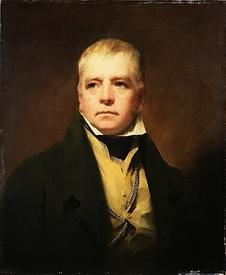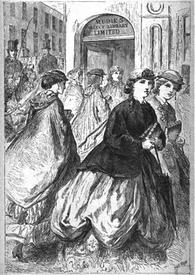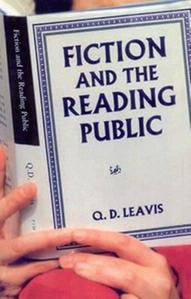We say "the reading public" so often in our business that you might be tempted to think we know what it means.

|
|
| Sir Walter Scott | |
Perhaps this not-so-distant cousin of every politician's go-to phrase--"the American people"--is ubiquitous because it has transcended mere definition ("I am more than happy to give the reading public exactly what they want"; "there is a big appetite among the reading public for books about the lives of so-called 'ordinary people' "; "created a lively appetite for Ulysses among the reading public"; "But Methuen had underestimated the reading public"; "the reading public has long been fascinated with anything having to do with Charlotte Brontë").
Apparently we can place the blame for its existence squarely on the shoulders of Sir Walter Scott, who coined the term in an 1812 letter to Lord Byron, writing that "besides this debt, which I owe your Lordship in common with the rest of the reading public, I have to acknowledge my particular thanks for your having distinguished by praise, in the work which your Lordship rather dedicated in general to satire, some of my own literary attempts."
Since then, we've kept the reading public at our side, like a cross between favored pet and lab rat, hoping it will someday, somehow, develop the ability to communicate and share its bookish secrets with us:
1853 (Hartford Daily Courant): "There has probably never been, in the history of our country, a period when so many books are issued to the reading public as the present."
 1880 (Cincinnati Enquirer): "The credulity of the reading public has been severely taxed in the past year by the claims of the 'Literary Revolution.' "
1880 (Cincinnati Enquirer): "The credulity of the reading public has been severely taxed in the past year by the claims of the 'Literary Revolution.' "
1887 (The Independent) Thomas Wentworth Higginson: "No reading public likes an excess of any kind of treatment. Whether idealism chokes it in gas, or propriety stiffens it with starch, or realism suffocates it with common dust, there is equally a struggle of resistance."
1893 (San Francisco Chronicle): "We do not sell books. We sell titles and covers. The public demand something on the verge of indelicacy at least. In the reading public there is a strong wave for the meretricious."
1898 (The Bookman): "Whether trade can be called good or not, one thing is certain--an enormous quantity of literature is being purchased by the reading public. In years gone by such a state of things would have meant fortunes for the publishers, but competition among them and among booksellers reduces the producing and selling of books to a bare living."
1926 (Fiction and the Reading Public by Q.D. Leavis): "The book-borrowing public has acquired the reading habit while somehow failing to exercise any critical intelligence about its reading.... And by accustoming the reading habit to certain limited appeals and a certain restricted outlook, it has spoilt the public for fiction in book form of a more serious nature."
 1983 (Philadelphia Inquirer) Art Buchwald on the ABA convention in Dallas, Tex.: "All in all it was a very successful book convention, and the reading public has a lot to look forward to this winter. Requited and unrequited passion, friendly and unfriendly computers, reincarnation with a British M.P., and hundreds of books on how to stick it to the IRS are just a few of the subjects that will be available on your booksellers' shelves in the fall."
1983 (Philadelphia Inquirer) Art Buchwald on the ABA convention in Dallas, Tex.: "All in all it was a very successful book convention, and the reading public has a lot to look forward to this winter. Requited and unrequited passion, friendly and unfriendly computers, reincarnation with a British M.P., and hundreds of books on how to stick it to the IRS are just a few of the subjects that will be available on your booksellers' shelves in the fall."
1984 (New York Times): "One of the most important if unnerving trends is that there is no longer a 'mass market' for any but a handful of books. 'Today it's a lot of mini-markets,' said Carole Baron, publisher of Dell Publishing Company. 'Every once in a while a book appeals to almost all segments of the reading public, a Danielle Steel or Stephen King, but not too many others do. Gone are the days when we would sell six million copies in six months.' "
1988 (Los Angeles Times): "Al Ralston, a former journalism instructor and now owner of Fullerton's Book Harbor, isn't worried about the intrusion of TV on the reading public. 'The best thing that ever happened to books is TV. It's so rotten that people are reading more than ever before. Why is it that VCRs and CDs are booming as never before? People are turned off on TV. It's so godawful.' "
1989 (Newsday) George Will on the closing of NYC's Scribner's Bookstore after 75 years: "It is of course splendid when one of the large chains orders your book in the thousands, but there is a special pleasure in the personal judgments of these intense individualists who bring their interests to the attention of small portions of the reading public.... Bookselling, like the country it reflects, is still a bouillabaisse, not a bland puree."
1992 (Allentown Morning Call) Waldenbooks CEO Charlie Cumello: "In some marketplaces, we missed the reading levels of the people. We as an industry were not giving the reading public the selection they wanted, and I think that's been proven."
"The reading public" continues to evade strict definition as yet another century unfolds, but like any good pageturner, it is also sublimely unputdownable.

